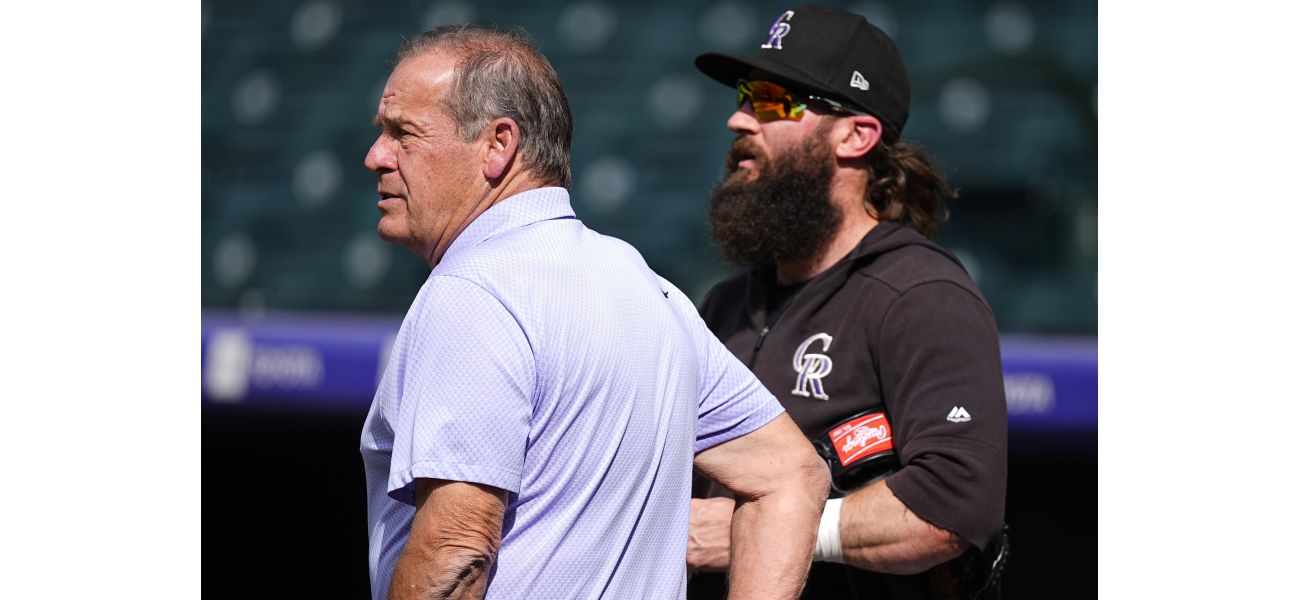Colorado's payroll is currently declining, which is not a problem at the moment, but could lead to financial troubles in the future.
The Rockies can be justifiably criticized for their spending habits.
November 2nd 2024.

As a sports writer, I often hear the same complaint from Rockies fans. They believe that owner Dick Monfort is a penny-pinching miser who refuses to invest in the team on the field, despite the fact that fans continue to flock to Coors Field. This criticism reached a fever pitch when I reported that the team's payroll would decrease in 2025.
However, I must say that this criticism is not based on facts. While it is fair to criticize the way the Rockies have spent their money, it is important to note that their payroll has consistently aligned with their status as a mid-market team. In 2018, the Rockies' payroll ranked 13th in the league, and in 2019 and 2023, they ranked 11th and 14th, respectively. It is worth noting that their payroll did decrease in 2024, but this can be attributed to the disruption of regional sports networks, which affects many teams who do not have their own TV networks.
Looking ahead, I predict that the Rockies' payroll will continue to decrease as they trade away some players and let go of others. This may result in a payroll as low as $130 million, but keep in mind that this does not include the $13 million that will no longer be on the books for Charlie Blackmon. As the team's lower-cost youth movement takes full swing, I expect their total payroll to rank around 20th out of 30 teams in the league. While some may criticize this approach, I believe it is the right one for the team at this time.
It is important to save resources to invest in young players like Brenton Doyle, Chase Dollander, Carson Palmquist, Zac Veen, and Yanquiel Fernandez. These players have the potential to become the stars of tomorrow, and it is crucial for the Rockies to prioritize their development. This was evident in the shrewd move made by general manager Bill Schmidt and the front office when they signed shortstop Ezequiel Tovar to a seven-year contract extension worth $63.5 million. This deal also includes a team option for 2031 that could bring the total value to $84 million. Tovar has the potential to become the best shortstop in franchise history, making this contract a bargain.
It is no secret that the Rockies will never have the financial resources of teams like the Mets, Dodgers, Yankees, and Phillies. However, this does not mean they cannot compete. In order to break their losing tradition, the Rockies must focus on developing their own players and making smarter decisions with their payroll. In 2024, the team spent $2.41 million per win, which ranked 14th in the league. This is significantly less than the Mets, who ranked first with a payroll of $317.8 million and spent $3.57 million per win. Other playoff teams with lower payrolls also spent less per win, showing that it is possible to be successful without breaking the bank.
As the Rockies look towards a new era, it is important for them to avoid making costly mistakes with their payroll. This includes the decision to sign Kris Bryant to a seven-year, $172 million contract, which many believe was an attempt to make up for the unpopular trade of Nolan Arenado. While Bryant is still a talented player, it is clear that the Rockies overpaid for his star power, and this contract will continue to affect their payroll for the next four years. Similarly, the decision to pay Charlie Blackmon $13 million for his final season was based more on sentimentality than practicality, as evidenced by the Pittsburgh Pirates giving Andrew McCutcheon a one-year, $5 million contract.
Another questionable decision was the two-year, $19 million contract given to closer Daniel Bard in 2022. While he was performing well at the time, his age and history of anxiety issues should have been taken into consideration. As expected, his performance declined in 2023 and injuries prevented him from pitching at all in 2024. This is a prime example of the Rockies' wishful thinking and reluctance to make trades coming back to haunt them.
Given their current situation, it makes sense for the Rockies to have a smaller payroll. The time to spend big was back in 2018 when they had a strong team in place, but they did not take advantage of that opportunity. Now, they must focus on developing their own players and making smarter choices with their payroll in order to compete with the financial powerhouses of the league.
However, I must say that this criticism is not based on facts. While it is fair to criticize the way the Rockies have spent their money, it is important to note that their payroll has consistently aligned with their status as a mid-market team. In 2018, the Rockies' payroll ranked 13th in the league, and in 2019 and 2023, they ranked 11th and 14th, respectively. It is worth noting that their payroll did decrease in 2024, but this can be attributed to the disruption of regional sports networks, which affects many teams who do not have their own TV networks.
Looking ahead, I predict that the Rockies' payroll will continue to decrease as they trade away some players and let go of others. This may result in a payroll as low as $130 million, but keep in mind that this does not include the $13 million that will no longer be on the books for Charlie Blackmon. As the team's lower-cost youth movement takes full swing, I expect their total payroll to rank around 20th out of 30 teams in the league. While some may criticize this approach, I believe it is the right one for the team at this time.
It is important to save resources to invest in young players like Brenton Doyle, Chase Dollander, Carson Palmquist, Zac Veen, and Yanquiel Fernandez. These players have the potential to become the stars of tomorrow, and it is crucial for the Rockies to prioritize their development. This was evident in the shrewd move made by general manager Bill Schmidt and the front office when they signed shortstop Ezequiel Tovar to a seven-year contract extension worth $63.5 million. This deal also includes a team option for 2031 that could bring the total value to $84 million. Tovar has the potential to become the best shortstop in franchise history, making this contract a bargain.
It is no secret that the Rockies will never have the financial resources of teams like the Mets, Dodgers, Yankees, and Phillies. However, this does not mean they cannot compete. In order to break their losing tradition, the Rockies must focus on developing their own players and making smarter decisions with their payroll. In 2024, the team spent $2.41 million per win, which ranked 14th in the league. This is significantly less than the Mets, who ranked first with a payroll of $317.8 million and spent $3.57 million per win. Other playoff teams with lower payrolls also spent less per win, showing that it is possible to be successful without breaking the bank.
As the Rockies look towards a new era, it is important for them to avoid making costly mistakes with their payroll. This includes the decision to sign Kris Bryant to a seven-year, $172 million contract, which many believe was an attempt to make up for the unpopular trade of Nolan Arenado. While Bryant is still a talented player, it is clear that the Rockies overpaid for his star power, and this contract will continue to affect their payroll for the next four years. Similarly, the decision to pay Charlie Blackmon $13 million for his final season was based more on sentimentality than practicality, as evidenced by the Pittsburgh Pirates giving Andrew McCutcheon a one-year, $5 million contract.
Another questionable decision was the two-year, $19 million contract given to closer Daniel Bard in 2022. While he was performing well at the time, his age and history of anxiety issues should have been taken into consideration. As expected, his performance declined in 2023 and injuries prevented him from pitching at all in 2024. This is a prime example of the Rockies' wishful thinking and reluctance to make trades coming back to haunt them.
Given their current situation, it makes sense for the Rockies to have a smaller payroll. The time to spend big was back in 2018 when they had a strong team in place, but they did not take advantage of that opportunity. Now, they must focus on developing their own players and making smarter choices with their payroll in order to compete with the financial powerhouses of the league.
[This article has been trending online recently and has been generated with AI. Your feed is customized.]
[Generative AI is experimental.]
0
0
Submit Comment





